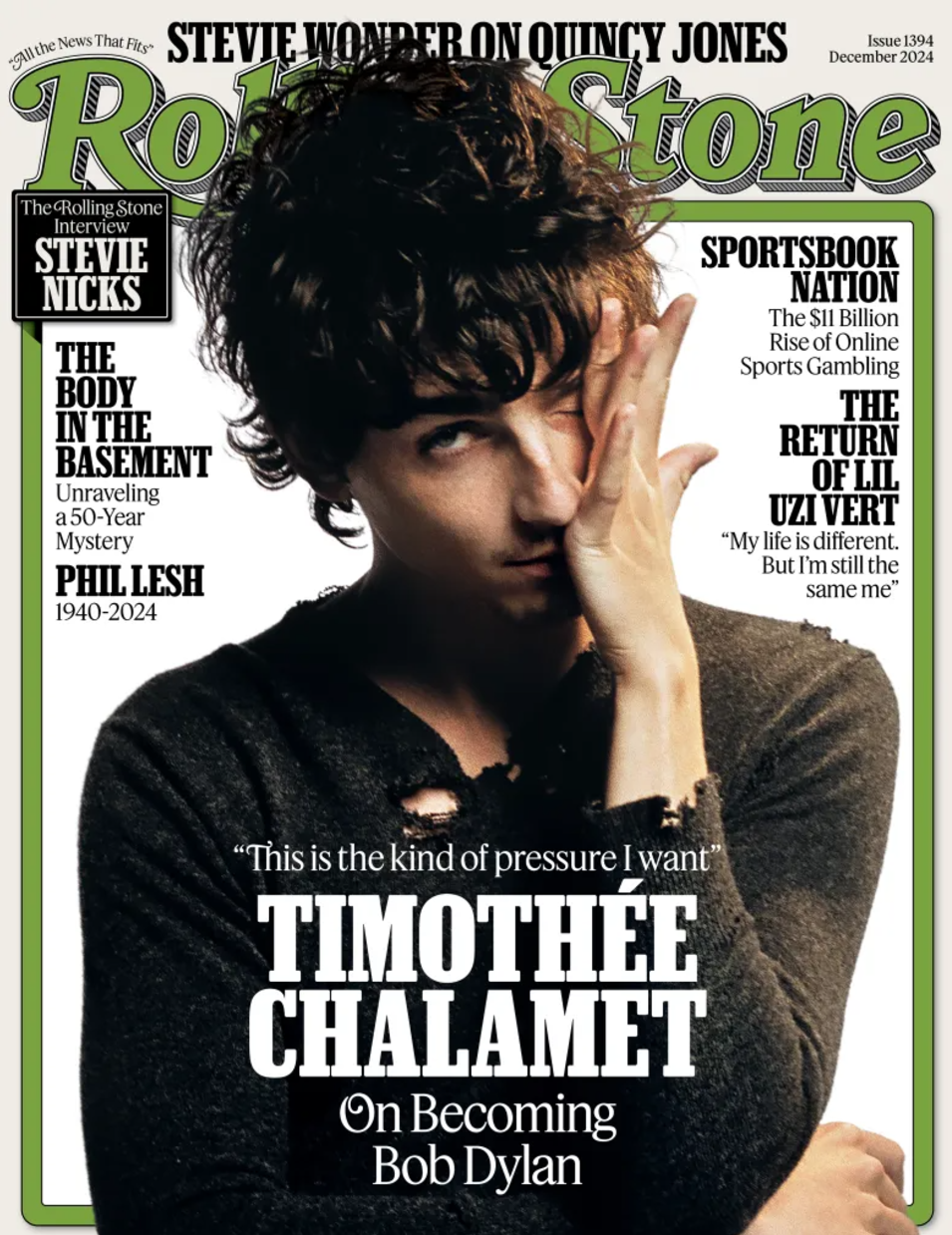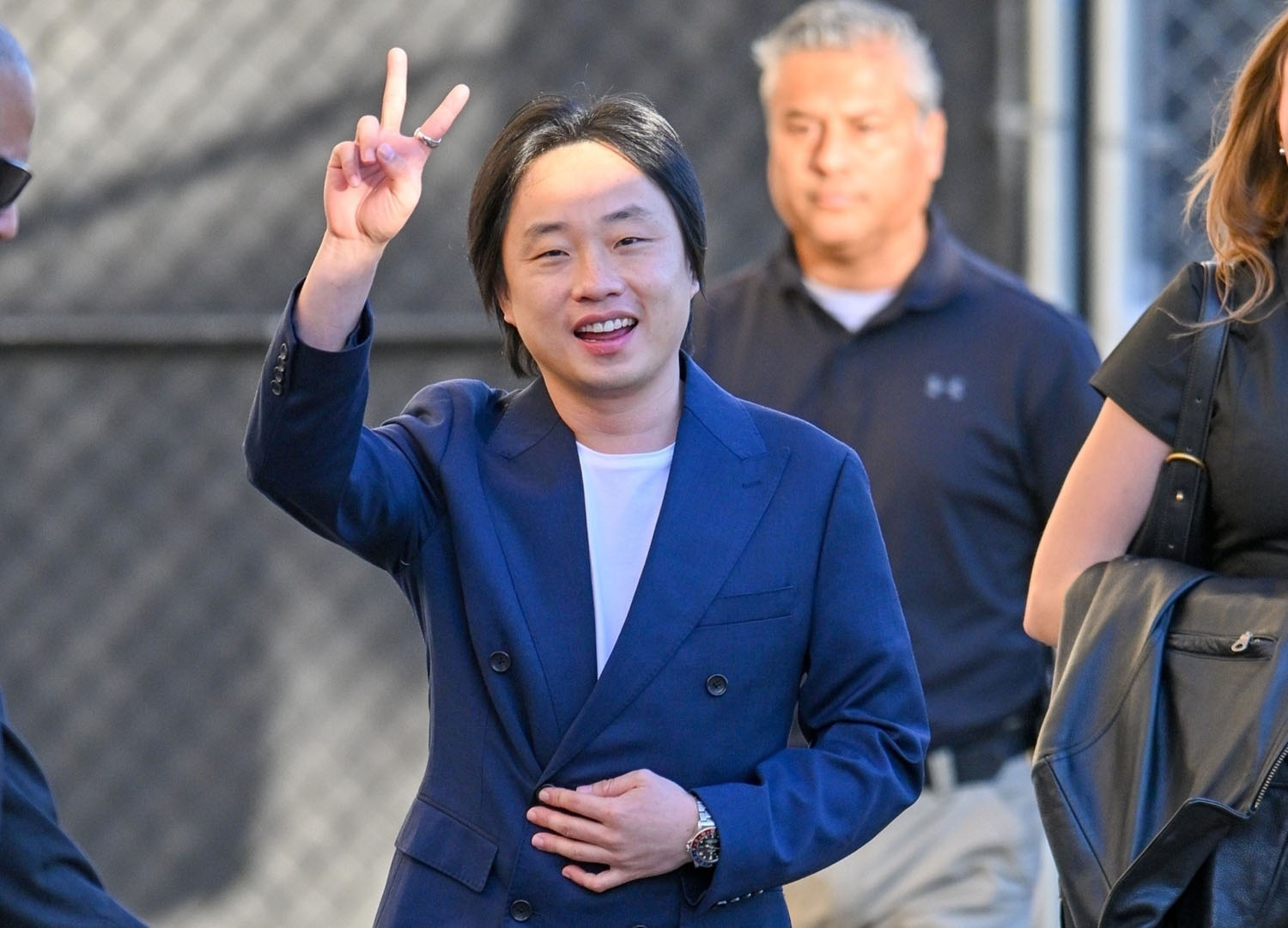How Timmy found Bob



Through this entire year in the Best Actor Oscar race, everyone’s been leaving a spot open for Timothée Chalamet. He’s widely regarded as one of the most talented actors of his generation. He’s already been nominated for Oscar – and that was six years ago! – it’s only a matter of time before he wins one. And in A Complete Unknown he’s playing Bob Dylan. So well before filming had even wrapped, people were predicting that the Academy would invite him back.
As I mentioned in yesterday’s site open the first screening(s) of A Complete Unknown are happening this week, so we’ll be hearing first reactions in a couple of days. This, then, is the start of promotion. And if he covers just one magazine for this particular press tour, of course it has to be Rolling Stone. After all, he’s playing a musical titan, a man who is almost myth at this point, a man who has covered Rolling Stone countless times, including on the magazine’s Immortals issue, released 20 years ago to mark the 50th anniversary of rock. Over the next few weeks and months, we’re going to be hearing a lot, maybe to the point of nausea, about how Timothée Chalamet became Bob Dylan; about his process and preparation; about his commitment to the role; about how he had to lose himself to find his muse.
That’s why what was most interesting to me in this profile is Timmy talking about how he relates to Bob Dylan and how that relates to his relationship with his own celebrity. That, of course, has always been my kink and the focus of our site: fame, those who seek it and wield it.
I have no experience with Bob Dylan. And I’ve never wanted to experience Bob Dylan. I connect my lack of interest in Bob Dylan to my lack of interest in Seinfeld. All of this goes back to high school in the late 80s and early 90s where I was surrounded by kids from predominantly affluent white families discovering the music of their parents and watching what their parents watched. That was not my background, not my life. I gravitated towards hip-hop and R&B, pop, Top 40 radio, shows about teens. At home I was still watching Hong Kong soap operas with my parents. All of that would continue in university so even though I was aware of classic rock because it was always being played around me in the bleachers and at parties, the music was never a defining part of my formative years. And I’m telling you this because I’m going into this movie about Bob Dylan, one of the biggest icons of his time and beyond, starring Timothée Chalamet, one of the biggest stars of his time and likely beyond, with close to zero context.
Which means I’ll actually be in the same position as many people of Timmy’s generation seeing the film. Because as noted in Rolling Stone, they didn’t make it just for those who know. The hope is that A Complete Unknown introduces Dylan to a younger demographic. And in fact that was my experience after seeing James Mangold’s Walk the Line: I became a Johnny Cash fan. Also totally obsessed with Joaquin Phoenix.
People are already obsessed with Timmy, though. Joaquin Phoenix arguably only became a capital M, capital S, Movie Star, after Walk the Line. Timothée was already a Movie Star when he started filming A Complete Unknown. It’s how he arrived at movie stardom that he can relate to Bob Dylan – and this might be the first time he’s articulated his previous ambitions and how it worked out for him. Per Rolling Stone:
“He soon learned that Dylan at first saw himself as a rock artist, but ended up a folk-music superstar, before winding his way back to rock stardom. Chalamet quickly mapped that scenario onto his own experience. The way he likes to see it, Dylan, for all his reverence of figures like Guthrie, Lead Belly, and Odetta, used the folk world as a sort of back door. “If he couldn’t become Elvis or Buddy Holly immediately,” Chalamet says, “he found Woody Guthrie and stuff that was a little more accomplishable, and happened to be really good at it. And that immediately hit a bone with me.”
Because Timmy initially wanted to be a superhero. He auditioned for the big blockbuster movies and was rejected – for not, physically, being the blockbuster ideal.
“He was a brilliant young actor with an extraordinary knack for choosing rich indie roles, but he was also taking what he could get. “I was knocking on one door that wouldn’t open,” he says. “So I went to what I thought was a more humble door, but actually ended up being explosive for me.” Chalamet eventually found his way into the Dune movies, and he unabashedly sees his turn as a sandworm-riding space messiah in the year 10,191 as his own going-electric moment.”
So Timmy was, eventually, a superhero… just not in the way he had initially imagined. His box office is two Dunes and a Wonka – not small achievement – and of course his independent films often gross beyond their budget. This is the first time he’s framed his success in this way and he can do it now, of course, because it all worked out. And still, I appreciate that he’s out here talking about his early visions of stardom without shame, if only as an opportunity yet again to eyeroll Jacob Elordi, lol.
Speaking of taking it all too seriously, there’s a good balance here between Timmy’s “method”, as in staying in character but not so much that it gets into Jared Leto territory, and also his confidence in his own talent in what he’s able to bring to a role, his talent being enough. Which is another bond between him and Bob Dylan:
“He also related to the idea that Dylan’s story, and his art, can’t be boiled down to any particular trauma. Unlike Cash or, say, Dewey Cox, he’s unburdened by his past, doesn’t look back. Dylan has never once had to think about his entire life before he plays, and neither has Chalamet. “I related to the feeling that my talent could be my talent,” he says. “I could draw the picture of an unconventional upbringing. I grew up in arts housing, Manhattan Plaza, which is a funky way to grow up. I could try to paint it negatively to you. I could try to paint it positively, but it’s a bit of everything. It’s nuanced.” His point is that it doesn’t matter. “I don’t need to point to some thing in my youth. Your talent is your talent. The thing you gotta say is the thing you gotta say. You don’t need the Big Bang.”
If we’re talking about struggle though, where his celebrity is concerned, and the impact it’s had on him as an artist, given that few people of his generation (this is why he and Zendaya, Florence Pugh, Austin Butler were such a fascinating Dune cohort) have experienced it the way he has, Timmy could if he wanted to, point to fame and how its altered the trajectory of everyday existence as a traumatic event. He is given multiple opportunities in this interview to do so – and declines every time. Timothée Chalamet, at least today’s version of him, does not want to publicly complain about the unique status he holds in pop culture. No doubt he’s encountered certain limitations because of the public fascination with him. But there are also so many benefits – and, of course he’s aware enough not to bitch about being too famous in Rolling Stone, and this is one area where he could have extended the connection with Bob Dylan but declines:
“I just don’t want to use those words, ‘isolated’ and ‘fear’ and ‘paranoia,’. I just think it’s not the correct way to go about the fortune and blessing that it is to work, whether they ring true or not, and bring attention to that kind of feeling-state. Even if it’s valid, it’s not really somewhere I want to go.”
And now I’ve just realised that on the long list of things that Timmy Chalamet is good at, we have to add the celebrity profile to it. I’ve not read a single bad profile of him in all the time he’s been this famous. He presents himself as a willing subject to his profilers, he always offers something new but also not too much. He is never false humble but also not too full of himself. Near the end of the Rolling Stone piece, it’s brought to his attention that he’s often playing “the one” in his movies. But isn’t he also “the one” in Hollywood too? At least in this new jack class of stars who’ve been passed the movie star torch at a time when fewer movie stars are made and even the very existence of them is being questioned. Turns out it was the scrawny theatre kid from New York who soared above them all.
Click here for more of Timmy in Rolling Stone.
We're Squawking about Timmy and his Rolling Stone profile today. Join us! (App link here)

